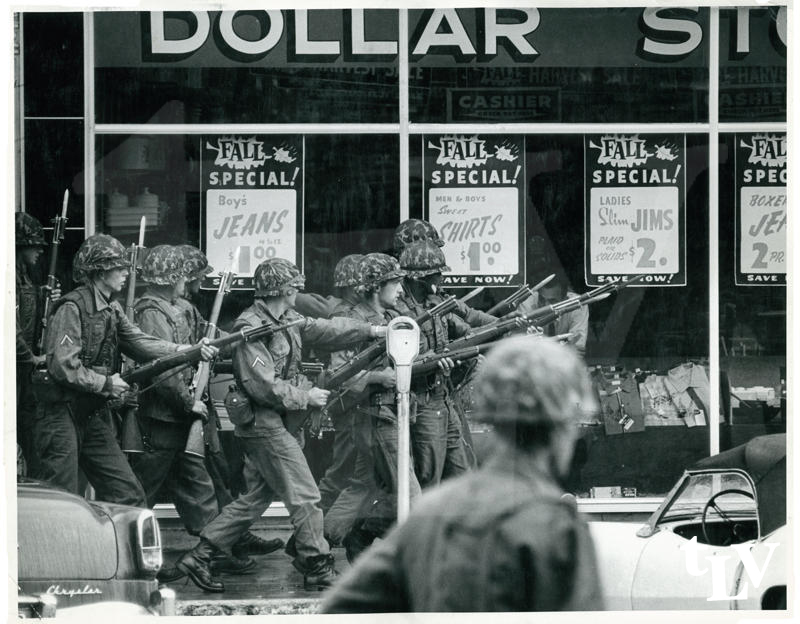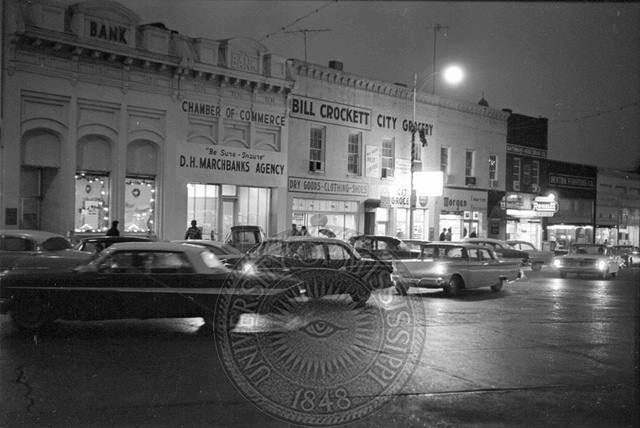
“The night of September 30, 1962 James Meredith integrated the University of Mississippi, backed by 300 federal marshals and 30,000 troops, as thousands of white students and outsiders ran riot over the campus. Two men were left dead and at least 300 people were wounded, yet not one student was expelled, not one attacker convicted.”
– David Halbfinger, New York Times, September 29 , 2002
Students are now returning to class at Ole Miss, and each September brings back memories of 1962 and the enrollment of James Meredith. Fifty years have come and gone and so have many specific memories, but I’ll share a few that are still vivid to me.
I was a young 2nd Lieutenant in the New Albany Unit of the Mississippi National Guard (MSNG) and was assigned as a platoon leader. I had graduated from Officer Candidate School the previous August, completed the Armor Officer School at Fort Knox, and trained with my platoon at Camp Shelby that Summer. I was fortunate to have an experienced platoon with many prior servicemen.
Our unit was notified that we had been placed on federal status and that we needed to be prepared to move to Oxford and the Ole Miss campus on order. I remember guiding my platoon through riot control formations behind the New Albany Armory while Mississippi Highway Patrolmen gathered across the street at their headquarters.
There was good natured joking between the federalized guardsmen and the state patrolmen on what role each would be assigned. We took the position that we would carry out our assigned orders and protect ourselves regardless of who or what attacked us. It was the beginning of a band of brothers in our unit.
We received orders late Sunday afternoon (September 30, 1962) to travel from New Albany to the Oxford National Guard Armory. En route, we had small transistor radios and listened to various radio stations giving reports of rioting on campus. Most of those reports were later found to be false but at the time served to keep us alert as we entered Oxford on Highway 30.
We made our way up North Lamar to the Courthouse Square and to University Avenue where the Armory was located. It was dark as we entered the Square, and it looked as if wall to wall people were lining the sidewalks. I was in a quarter-ton jeep approaching The Square when we were startled by blinding camera flashbulbs. This further increased our level of alertness.
As soon as we arrived at the armory, we were lined up in preparation to move back out for the Ole Miss campus. Rations and ammunition were distributed, and all personnel remained in their vehicles from 6 to 7 hours awaiting the order to move out. Just before dawn, that order came to occupy and secure the area of Sorority Row from The Grove to Highway 6.
As we made our way down University Avenue, there were crowds of people standing along the street, and it was surprising that many turned their backs on us as we passed. There were no incidents, however, which is what we communicated by radio once we occupied our assigned area.
Our unit was in place at daybreak; other units were then ordered to follow us to their assigned areas. They were met with a barrage of bricks and gunfire. In fact, the Squadron Commander had a bullet hit his jeep just below his seat, and the canvas tops of trucks were split and torn by bricks which injured a number of troops.
Our unit secured the area assigned, and residents of faculty housing and sorority houses came out and thanked us for providing security from the fear of mob violence. They gave us sandwiches and coffee and the use of a daylight basement for off duty troops to sleep.
Several things occurred at this particular location, but two incidents stand out in my memory. In late afternoon, a staff officer came to our area and relayed the order to me for my platoon to move to Highway 6 to set up a roadblock and search all vehicles for weapons. There were media reports that a retired General, Edwin Walker, was coming from Texas with an armed mob with threats to take over the Ole Miss campus in order to remove Mr. Meredith.
We eventually learned that the media reports weren’t based on fact when we found a few vehicles containing rifles and shotguns, their owners prepared for squirrel season. Once the weapons were checked out by headquarters, the owners were released.
Early the next morning, we were notified to expect a convoy of 82nd and 101st Airborne U.S. Army troops that would be utilized if they were needed. A steady stream of vehicles passed for what seemed to be hours; there must have been thousands of troops.
My platoon was later selected to be a “Ready Platoon” and moved to an area next to the football stadium. Approximately 200 military tents were set up for the Mississippi National Guardsmen, the Military Police, and the higher ranking officers.
We were issued large tear gas canisters and a communication radio, and we had the mission of supplying a guard post located near the dormitory which housed Mr. Meredith in order to provide protection. The platoon had to be in formation in all battle gear and ready to move out every time Mr. Meredith was escorted to his classes or to the cafeteria.
An Army MP unit moved in to occupy space next to our unit near the stadium. That unit was racially integrated and seemed to have internal friction. A few of their members placed rebel flags on their pup tents and their 1st Sergeant who happened to be Black ordered for their removal.
One day during a lull in activity, I recall someone suggesting a softball game between the MP unit and our MSNG unit as a way to relieve some stress. Thankfully, this good natured competition helped to temporarily relieve the racial tension within our units.
Periodic family visits also helped the men; I remember one occasion when my wife and baby came for a short visit and brought some of my Mama’s fried peach pies and cookies. I shared the cookies, but those fried pies were just too valuable to share.












This article was originally published in The Local Voice #37, September 20, 2007. Colonel John Cole is retired and lives in Oxford, Mississippi. Photographs are from the personal collection of Robin Owen Cotten, Sr., who was the lead field FBI agent in Mississippi at the time of the Ole Miss integration riots. Agent Cotten passed away in 2009 in Oxford. Special thanks to Al and E.J. Cotten of Cotten Tutoring 662-234-2232.
© 2007 The Local Voice – Rayburn Publishing – All Rights Reserved.


